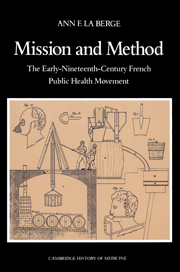Book contents
- Frontmatter
- Contents
- List of tables and illustrations
- Preface
- Acknowledgments
- Introduction
- I Community, method, context
- II Carrying out the mission: Institutionalization, investigation, moralization, and practical reform
- III Public health before Pasteur
- Chapter 8 Public health and public health movements: Comparison and assessment
- Chapter 9 Before Pasteur: Hygienism and the French model of public health
- Epilogue
- Appendixes
- Bibliographical Note
- Index
Chapter 9 - Before Pasteur: Hygienism and the French model of public health
Published online by Cambridge University Press: 17 September 2009
- Frontmatter
- Contents
- List of tables and illustrations
- Preface
- Acknowledgments
- Introduction
- I Community, method, context
- II Carrying out the mission: Institutionalization, investigation, moralization, and practical reform
- III Public health before Pasteur
- Chapter 8 Public health and public health movements: Comparison and assessment
- Chapter 9 Before Pasteur: Hygienism and the French model of public health
- Epilogue
- Appendixes
- Bibliographical Note
- Index
Summary
The overarching mission of the French public health reformers was hygienism, a belief that all areas of life should be medicalized and moralized to prevent disease and promote public health in the interest of social order and national security. Hygienism was developed within a statist context. French society was to be medicalized and moralized by state agencies and institutions, with professional hygienists serving the state as advisors and hygienic missionaries. This did not necessarily imply the bureaucratization of medicine, however, although some favored this approach, since physicians in private practice might also carry out these goals. The notion of hygienism was derived in part from prevailing theories of disease causation, which attributed most diseases to environmental and social causes. Since almost anything might potentially cause disease, hygienism had to be all-encompassing. The experts, the professional hygienists who were to act as advisors and help determine policy, had to achieve authority and legitimacy by cloaking their work with the mantle of science. The increasing scientism of French society required that if a particular approach or discipline was to be taken seriously, it had to be scientific. Hygienism thus incorporated a community of practitioners, professional hygienists who applied scientific methods to the study of public health problems and sought to transform public hygiene into a scientific discipline. The method was an important part of the mission.
Hygienism outlived Pasteur. Indeed, Pasteur's discovery that microorganisms caused some diseases provided further scientific justification for the program of the hygienists.
- Type
- Chapter
- Information
- Mission and MethodThe Early Nineteenth-Century French Public Health Movement, pp. 316 - 319Publisher: Cambridge University PressPrint publication year: 1992

